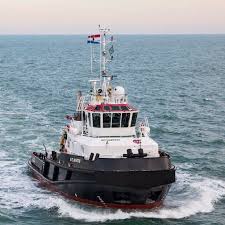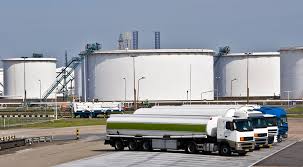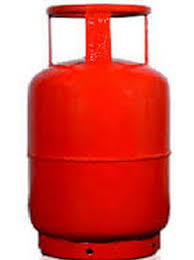Tugboat Hiring And Leasing Business In Nigeria; The Pre-Feasibility Report.

Tugboats, also known as tugs, are powerful boats used for maneuvering larger containerships, tankers, and cruiser ships in and around dockyards and harbors. Tugboats are also employed for pushing or pulling non-self-propelled vessels such as barges and oil platforms.
These boats are quintessential in docking/harboring operations and help larger vessels and ships to pass through slender passages. Engines required to empower these tugs are also large and powerful. These engines provide power to move huge vessels around.
Functions of Tugboats
•Moving ships in and out of berth
•Guiding ships in case of dangerous cargo (LNG/LPG)
•Guarding ships during loading/unloading activity
•Docking
•Towing barges
•Salvaging and towing a wrecked ship
•Ocean towing
•Transporting
Technical crew on Tugboat:
A typical tugboat crew consist of three to four member depends on the size of the boat.
Captain: The tugboat captain is like the captain of any other ship
Mate: The second-most important position on the tugboat is that of the mate , The mate has to work in close co-ordination with the captain and under his guidance ensure that the tugboat carries out its operation smoothly. The mate is in-charge of the overall navigation and towing functionalities. The mate needs to have prior experience; a fire-fighting and controlling certificate and has to have excellent English speaking skills.
Engineer: As is with any object involving complex machinery and fuel, the tugboat also requires the assistance of engineers. Since the role of the tugboat is to ensure the safe passage of ships bulky and huge in nature, the tugboats have to be maintained in prime condition at all times.
The role of the engineer in a tugboat is to make sure that the engines – both main and supplemental – are functioning properly. Also in addition to the engines, the engineer is required to make sure that all other equipments and gadgets in the tugboat are in perfect condition and will not cause any failure to the operation when brought into use.
Rise in trade and commerce calls for more number of shipping containers, oil tankers, and bulk carriers. This is boosting the demand for tugboats and their engines. Increase in demand for LNG has also led to commissioning of large number of LNG carrier ships. Growth in tourism has also resulted in commissioning of larger and better cruise ships. These factors are driving the demand for tugboats for harbor operations and canal passage.
The global Tug Boat Market can be segmented on the basis of engine power, fuel type and boat type.
By engine power type, the global Tug Boat market can be segmented into:
Less than 1000 Horsepower
Between 1000 and 2000 Horsepower
Between 2000 and 5000 Horsepower
Greater than 5000 Horsepower
By boat type, the global Tug Boat market can be segmented into:
Deep sea tugboat
Harbor tugboat
River tugboat
Others
By fuel type, the global Tug Boat market can be segmented into:
Diesel
Others
Owing to its significant features and growing demand, the market for tug boats is expected to grow at a good pace all across the globe during the forecast period.
This report aims at introducing the subject matter and provides a pre-feasibility on tanker vessel Business in Nigeria
Table of Contents
TABLE OF CONTENTS 1. Executive Summary 2. Crucial factors & Steps in decision making for Investment 2.1 SWOT Analysis 2.11 Strength 2.12 Weakness 2.13 Opportunities 2.14 Threats 3 Project profile 3.1 Opportunity Rationale 3.2 Project Brief 3.3 Market Entry Timing 3.4 Proposed Legal Status 3.5 Proposed Tug Boat Capacity 3.6 Project Investment 3.7 Proposed Location 3.8 Recommended project parameters 4. Sector & Industrial Analysis 4.1 Sector Overview 4.2 Sector Characteristics 4.21 Service Description 4.22 Service pricing 4.23 Demand 4.24 Threath to this industry 4.25 Environmental & Protection Aspect (NIMASA, DPR and NPA) 4.26 Standard and compliance issue 4.27 Requirement for provisional license 5. Legal Requirement 6 Administrative Requirement 6.1 Office Equipment 6.2 Tools & Equipment 6.3 Furniture & Fixture 7. Humans Resource Requirement 7.1 Technical Crew 7.2 Administrative Staff 8 Financial Analysis 8.1 Projected Income Statement 8.2 Projected Balance Sheet 8.3 Projected cash flow 8.4 Assumptions/Basis for financial projection 8.5 Inflation 8.6 Revenue assumption 8.7 No of Charter/month 8.8 Depreciation 8.9 Duration of dry docking
Project Specification:
Additional Info
Get this Report
Direct bank transfer
To order the report, Please do pay the sum of ₦30,000 into
Account Name : Foraminifera Market Research Ltd
Account Number : 274 20 569 37
Account Name : Foraminifera Market Research Ltd
Account Number : 101 76 603 95
Account Name : Foraminifera Ventures
Account Number : 011 66 066 32
Make your payment directly into our bank account. Please use your Order ID as the payment reference. Your order will not be shipped until the funds have cleared in our account.
Instructions
After payment call us on 01 -29 52 413 / 08033782777 or email us at foraminiferamarketresearch@yahoo.com with the payment details. After payment confirmation, the soft copy of the report would be sent to you within 24 hours.


